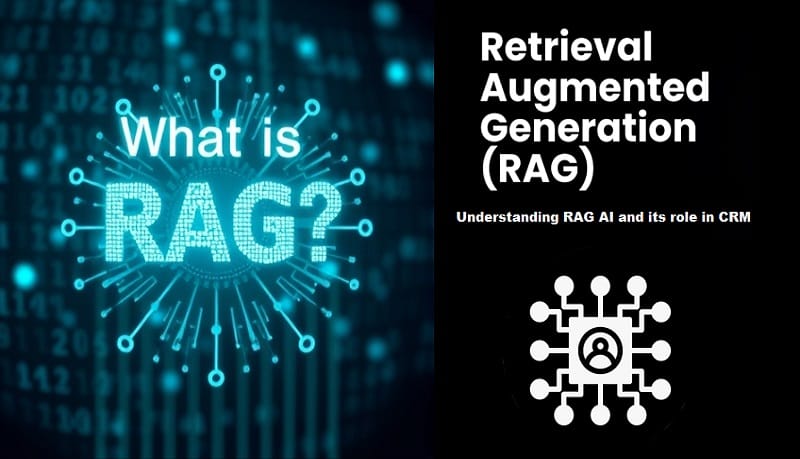Last updated on March 26th, 2025 at 11:52 pm
What is RAG AI
One of the recent groundbreaking developments in AI is RAG AI. It stands for Retrieval Augmented Generation (RAG) AI.
While the term sounds very technical, it essentially combines the strengths of two fundamental AI components –
Retrieval-based models
Retrieval-based models involve retrieval of relevant information from a large record of data or knowledge base. In simple terms, you can imagine it as a highly efficient search algorithm like Google having the ability to fetch the most relevant and pertinent information for you based on your specific query.
Generative AI
Generative AI involves the process of generating contextual content and responses based on its understanding and learnings of certain patterns. Most of us are aware of this concept made popular by ChatGPT from OpenAI.
To understand this concept better, let us take an example of a user wanting to research on a complex topic. In this case, RAG AI will first search and read all the information available in the repository, and it will then retrieve the most relevant information that is required. This forms the Retrieval phase. Once we have all the relevant information, the next phase involves the process of generating an accurate and contextual response to the specific query in natural language. The response will leverage its inherent understanding; and it will also incorporate the latest and most recent data pulled from all the sources.
Unlike traditional AI that produces general responses, RAG AI integrates the two components to provide responses that are highly relevant, accurate, and contextual with real-time data. It also gets articulated and presented in the most coherent way in natural language.
The key aspect to note is that, RAG AI does not just rely on some pre-trained static data. Because of its inherent capability, it can process vast datasets and actively fetch real-time information available for it to learn constantly. Which is why this technology is so powerful for use-cases that require immense depth of knowledge and a lot of flexibility in generating real-time and up-to-date contextual responses.
Top 5 Benefits of RAG AI
Accurate and Real-time Updates:
RAG AI constantly fetches real-time information. As a result, its results are always accurate and up-to-date reflecting the latest updates.
Contextual:
RAG AI responses are highly tailored and specific. It pulls in relevant information to deliver contextually-rich insights.
Enhanced Knowledge:
RAG AI has the power to fetch relevant information from vast data sources and knowledge repositories. This is important in use-cases requiring factual and accurate information.
Reduced Hallucinations:
RAG AI responses reduce the risk of hallucinations. It is unlike traditional AI models that often fabricates its own responses based on some past training data.
Versatile & Flexible:
RAG AI can fetch information from multiple data sources across all domains and industries without any limitations. It is adaptable to various kinds of applications and use-cases.
Role of RAG AI in CRM
CRM systems (Customer Relationship Management) are pivotal to the growth of any business. It is at the core of revenue operations encompassing all aspects of lead management, sales operations, client management, post-sales engagements, and customer interactions.
RAG AI is highly applicable and powerful when applied to the context of Customer Relationship Management (CRM). It can have a profound impact on your ability to run a sustainable and profitable business.
Let us discuss some interesting use-cases and implications –
Reporting & Decision Support:
RAG AI can quickly retrieve latest data from all available datasets to quickly generate intelligent reports. This allows real-time actionable insights to help your teams make better business decisions on-the-fly.
Improved Sales Forecasting:
RAG AI can provide accurate historical sales data and market trends. This information will help your sales teams forecast more accurately and manage their pipeline better.
Intelligent Recommendations:
RAG AI can provide real-time contextual and intelligent recommendations to help elevate your team’s sales performance. This will transform every sales interaction and performance.
Operational Efficiency:
Use of RAG AI eliminates the need for manual efforts required to collate, structure, and analyze data. Many of the backoffice CRM operations can be automated to drive tremendous operational efficiencies.
Accelerate Business Execution:
Technology does the heavy lifting in-terms of quick data retrieval and efficient analysis. It empowers your team with the ability to execute faster and efficiently.
Contextual Client Responses:
Team members can leverage RAG AI to easily access past client interactions and draft contextual responses to make clients feel valued.
Personalized Marketing:
RAG AI can help your marketing team extract insights and trends to come up with tailored messaging and campaigns.
Efficient Support Operations:
Support teams can get quick answers for query resolution by fetching relevant information from knowledge repositories.
These are just a few of the sample scenarios. As this evolves, we will see many other use cases in the future around lead management, multi-channel support, contextual proposals, etc.
 Bonus TIP – Maximize Your B2B Sales: The Ultimate Guide to CRM Implementation
Bonus TIP – Maximize Your B2B Sales: The Ultimate Guide to CRM Implementation
Key Considerations for Effective RAG AI Implementation
While there are numerous advantages of RAG AI, it is important to be aware of the key considerations and potential challenges while embarking on this journey.
Data Quality:
Effectiveness of a RAG AI project heavily depends on the quality of the data. Ensure that the datasets used are accurate and up-to-date for you to get the best results.
Cost Considerations:
It is essential to do a proper cost-benefit analysis while evaluating the different use-cases and scenarios. This requires proper due diligence to ensure that the initiative does not become very cost intensive.
Data Security:
RAG AI is best leveraged with large datasets. It is essential to ensure that the process adheres to stringent data security standards. This will help you protect sensitive information from any potential misuse.
Infrastructure for Scalability:
Retrieving real-time data from large repositories can get resource-intensive. Make sure you have the right cloud infrastructure optimized for performance and costs.
Conclusion
Retrieval Augmented Generation AI (RAG AI) is a significant leap forward in AI. It brings together the most powerful models of Retrieval and Generative AI to deliver highly accurate, contextual, and up-to-date results.
When integrated with CRM, RAG AI has the potential to transform the entire client experience and revenue operations. The shift will turn CRM systems into an intelligent platform that can predict, personalize, and respond with unparalleled insights. It will help organizations drive operational efficiencies and build deeper client relationships like never before.
Businesses must approach these initiatives with a lot of considerations to get the most optimum performance at affordable costs. A proper due diligence is required before you embark on this path.
As AI continues to evolve, the fascinating synergy between RAG AI and CRM software will position your business to be at the forefront of digital transformation. It has the power to become the cornerstone of modern operations laying the foundation for sustainable growth in an increasingly competitive environment.
To learn more about the key components of the architecture , you can read this article on the next generation of sales tech.




Comments are closed.